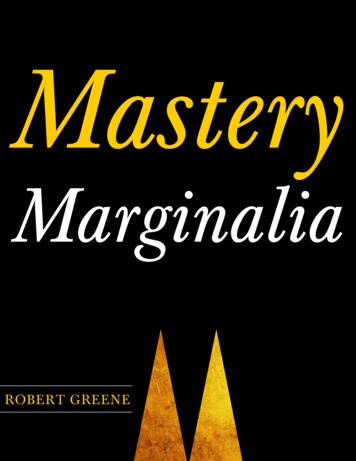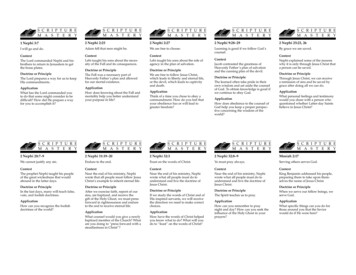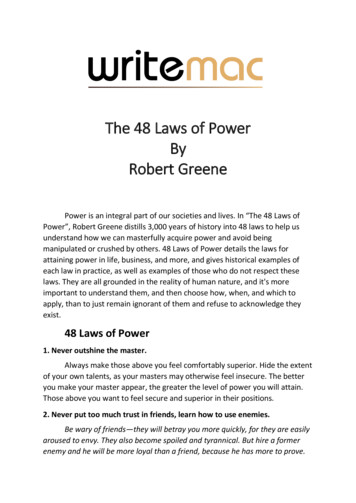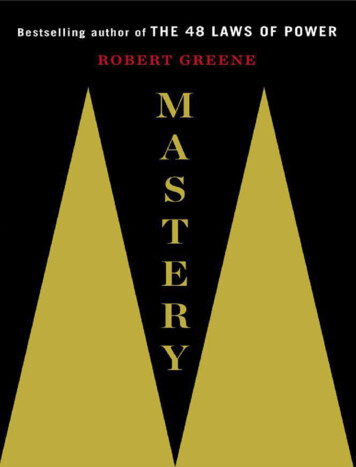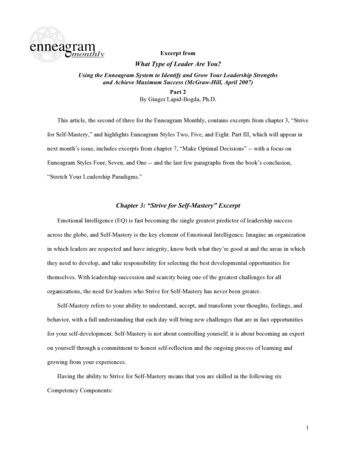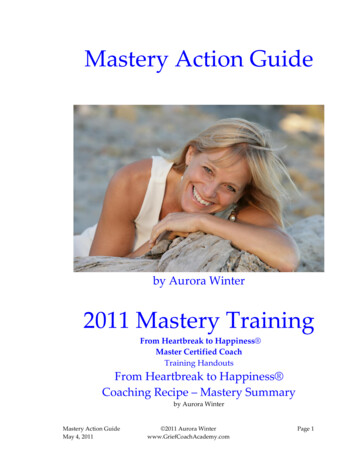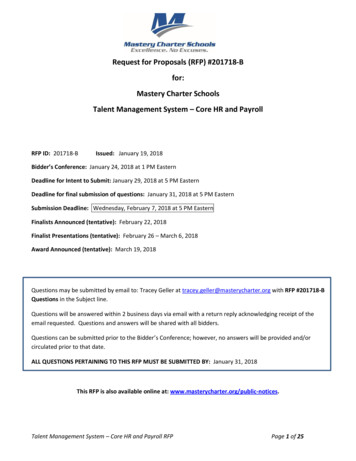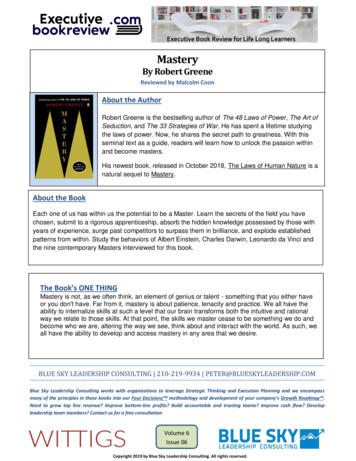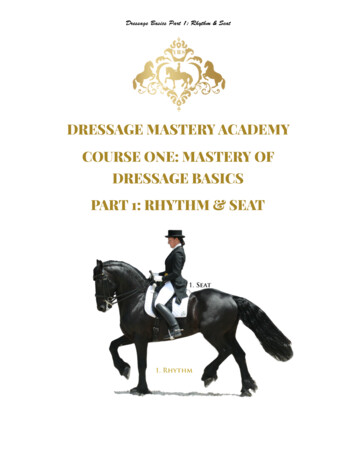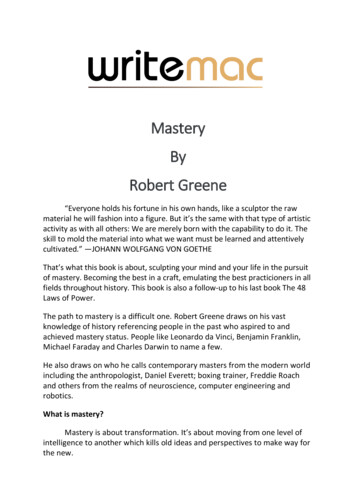
Transcription
MasteryByRobert Greene“Everyone holds his fortune in his own hands, like a sculptor the rawmaterial he will fashion into a figure. But it’s the same with that type of artisticactivity as with all others: We are merely born with the capability to do it. Theskill to mold the material into what we want must be learned and attentivelycultivated.” —JOHANN WOLFGANG VON GOETHEThat’s what this book is about, sculpting your mind and your life in the pursuitof mastery. Becoming the best in a craft, emulating the best practicioners in allfields throughout history. This book is also a follow-up to his last book The 48Laws of Power.The path to mastery is a difficult one. Robert Greene draws on his vastknowledge of history referencing people in the past who aspired to andachieved mastery status. People like Leonardo da Vinci, Benjamin Franklin,Michael Faraday and Charles Darwin to name a few.He also draws on who he calls contemporary masters from the modern worldincluding the anthropologist, Daniel Everett; boxing trainer, Freddie Roachand others from the realms of neuroscience, computer engineering androbotics.What is mastery?Mastery is about transformation. It’s about moving from one level ofintelligence to another which kills old ideas and perspectives to make way forthe new.
For people who have mastered their craft, it is a way of life. Always presentready to use when required.Greene says there is a simple process or path to mastery which is accessibleto all. Provided, of course, we are willing to put in the time, dedication,sacrifice and the ups and downs of learning new to become a master.1. Discover your callingGreene says what we lack most in the modern world is a larger purposeto our lives. This lack of purpose, Greene says, affects people in all kinds ofways even if they aren’t conscious of it. To achieve mastery you have to findyour vocation. Greene advises to think back to your childhood and ponderyour motivations as a child. This, he says, is your calling before parents,friends, peers, school and work took over. These are three steps to find yourcalling.Then he gives some strategies to discover your calling1. Return to your origins: for many of the masters, their inclinationpresented itself clearly during childhood. What were you obsessed withwhen you were younger?2. Occupy the perfect niche: Find where your interests align in a field toidentify a particular niche that you can dominate.3. Avoid the false path: We’ll all be attracted to fields for the wrongreasons: money, fame, parental influence. We have to rebel againstthese forces and be honest about what our interests are.4. Let go of the past: Avoid the sunk cost fallacy, if something is wrong foryou, abandon it. You’re not wedded to your past choices. Don’t feel likeyou have to rigidly stick with a plan that you set before.5. Find your way back: You’ll be tempted to deviate from the paththroughout your pursuit of mastery, even if you do mistakenly veeraway, you can always come back. Reminds me of Siddhartha.2. Submit to Reality: The Ideal ApprenticeshipOne must first have an apprenticeship to reach mastery. If you’rebeginning in a new field then this usually means starting at the bottom.During this time you will feel frustration because your brain has yet todevelop the neural connections between skillsets.
Greene says there are eight steps in the ideal apprenticeship.1.2.3.4.5.6.7.8.Value learning over moneyKeep expanding your horizonRevert to a feeling inferiorityTrust the processMove toward resistanceApprentice to failureCombine the ‘how’ and the ‘what’Advance through trial and error3. Absorb the Master’s Power: The Mentor DynamicGreene says having a mentor can turn ten years of self-mastery intofive years. Not through shortcuts but by streamlining the process and byensuring you don’t waste time in wrong areas of study.A mentor should push you into the abyss. Get you uncomfortable and giveyou self-doubt. It’s during these times that the learning and growth happens.And when you think you’ve learnt everything you have to set yourself a newchallenge and start again.Greene makes the point that toughness and constant connection to a realityare both requirements to achieve mastery. Self-help books, he says, promisetoo much for too little when in reality a lot of work has to go into makelasting change.Strategies for Deepening the Mentor Dynamic1. Choose the mentor according to your needs and inclinations - pickmentors who fill your needs, or what your parents didn’t.2. Gaze deep into the mentor’s mirror - choose a mentor who will give youtough love, reveal your strengths and weaknesses, and accustomyourself to criticism.3. Transfigure their ideas - learn from your mentors, listen, but cultivatesome distance by altering their advice to fit your own inclinations andstyle.
4. Create a back-and-forth dynamic - once you have gained respect foreach other by being coachable and open to learning, give them feedbackon their instruction, helping each other learn even faster.4.See People as They Are: Social IntelligenceWhat separates humans from other animals is our social intelligenceand our ability to sense what others are thinking and feeling.Humans take longer that other species to become independent from theirmother. According to Greene, this greater social bond between mother andchild makes us more naive about how the world works.This is what he calls the Naive Perspective and to achieve mastery we must gobeyond this to understand other people’s underlying motives. Not in anger ornot with emotion but with supreme acceptance.Social intelligence has two components:1. Specific knowledge of human nature: the ability to read people andunderstand how they see the world.2. General knowledge of human nature: understanding the patterns ofhuman behaviour, including the darker qualities we often disregard.There are patterns of negative human behaviour which each of us usually havepart of: Envy, Conformism, Rigidity, Self-obsessiveness, Laziness, Flightiness,and Passive Aggression. Understand how to spot and avoid triggering these.Envy: it is natural to compare ourselves to others, but too much praise orfriendliness can indicate envy.To avoid triggering, if you have a gift for a certain skill, make a point ofdisplaying weakness in another area - self-deprecating humour is good for this.Conformism: groups tend to trigger this. If you have a rebellious streak, becareful not to display your difference too overtly.Rigidity: we often default to habits or routines to counter the complexity ofdaily life.Accept the rigidity of others, but for yourself work to maintain your open spirit,get rid of bad habits, and continue to cultivate new ideas.
Self-obsessiveness: when you need something from someone, appeal topeople’s self-interest, and get used to looking at the world through their eyes.Laziness: we all tend to want the quickest, easiest path to our goals, but wegenerally try to control our impatience.Be prudent and keep your ideas close so they can’t be stolen, and secure creditin advance as part of teams working together.Flightiness: we like to think we are rational, but we are largely governed by ouremotions.Never assume that what people say or do in a particular moment is part oftheir permanent desires. Focus instead on their consistent actions.Passive aggression: the root cause of this is human fear of directconfrontation, and the emotions and loss of control conflict can cause.Focus only on the actions of others, and avoid those passive-aggressivewarriors full of insecurities at all costs.Strategies for Acquiring Social IntelligenceSpeak through your work - be efficient, detail-oriented, and make what youwrite or present clear and easy to follow, and this will show your care for theaudience or public at large.Craft the appropriate persona - people will judge you based on your outwardappearance - be aware of this and plan for it.See yourself as others see you - look at negative events in your past anddissect these occurrences. What patterns can we observe that reveal flaws inour character? Seek opinions from those you trust about your behaviour aswell, and begin to cultivate the ability to see yourself as you really are.Suffer fools gladly - they are simply part of life, like rocks or furniture. Smile attheir antics, tolerate their presence, and avoid the madness of trying to changethem.5. Awaken the dimensional mindGreene says we have two minds. The Conventional Mind and theOriginal Mind. The Conventional Mind is the mind which develops over theyears through experience and the pressure to conform to society.
“We force our minds into tighter and tighter grooves. We become defensiveabout the world we now take for granted, and we become upset if our beliefsor assumptions are attacked.”The Original Mind is the type of mind we have as children, when everythingseems new and interesting, and before we settle into a more fixed mindset.This is what drives the creative force within us.Masters, Greene says, retain a sizeable portion of their childhood spiritdespite the pressures and demands of adulthood.“Masters not only retain their spirit of the original mind, but they also add toit their years of apprenticeship and the ability to focus deeply on problems orideas.”“What kills the creative force is not age or a lack oftalent, but our own spirit, our own attitude. Webecome too comfortable with the knowledge we havegained in our apprenticeships. We prefer to live withfamiliar ideas and habits of thinking, but we pay asteep price for this: our minds go dead from the lackof challenge and novelty.”To awaken the Dimensional Mind and move through thecreative process, Greene says there are three essential steps;1. Choose a proper creative task2. Loosen and open up the mind through certain creativestrategies3. Create the optimal mental conditions for a breakthroughor insight6. Fuse the intuitive with the rationalThe final step to achieving mastery is through fusing the intuitive withthe rational. Through years of working in or studying a particular subject,
masters come to understand all elements on a deep and unconscious level.This high level of intuition is the ultimate form of mastery.Intuition is developed through following rational thinking. The two worktogether and it is the master’s depth of knowledge along with their analyticalthinking what creates intuition.This final stage of mastery does not come without its barriers and setbacksbut, as Greene says, this is part of the process.“You must see every setback, failure, or hardship as a trial along the way, asseeds that are being planted for further cultivation, if you know how to growthem. No moment is wasted if you pay attention and learn the lessonscontained in every experience.”Greene says there are strategies for attaining mastery which include; Connect to your environment. Detach from technology and take time out tolive primitive using only your inbuilt human sensesPlay to your strengths. Develop a supreme focus on what your strengths arenot your weaknessesTransform yourself through practice. You can’t achieve mastery throughnatural capabilities but rather it takes day-after-day, year-after-yeardedication and practiceInternalise the details. To truly master something you have to study andabsorb the small detailsWiden your vision. Most people are locked in the present, therefore, havinga wider vision and understanding will allow you to create a better strategy toprevailSubmit to the other. Place yourself inside of other people to understandthem and think like themKeys learning:1. Your life should be in a constant state of apprenticeship2. Having a direct mentor can shave five years off your skill development3. You can become a master regardless of ageQuotes:“The future belongs to those who learn more skills and combine them increative ways.”
“No one is really going to help you or give you direction. In fact, the odds areagainst you.”“The time that leads to mastery is dependent on the intensity of our focus.”“Become who you are by learning who you are.”“It is in fact the height of selfishness to merely consume what others createand to retreat into a shell of limited goals and immediate pleasures.”“The passive ironic attitude is not cool or romantic, but pathetic anddestructive.”“Everything that happens to you is a form of instruction if you pay attention.”“The problem is that we humans are deep conformists.”“The truth is that creative activity is one that involves the entire self - ouremotions, our levels of energy, our characters, and our minds.”Source: https://www.stedavies.com/masteryreview/#: :text es/19176675-mastery
Greene says there is a simple process or path to mastery which is accessible to all. Provided, of course, we are willing to put in the time, dedication, sacrifice and the ups and downs of learning new to become a master. 1. Discover your calling Greene says what we lack most in the modern world is a larger purpose to our lives.
